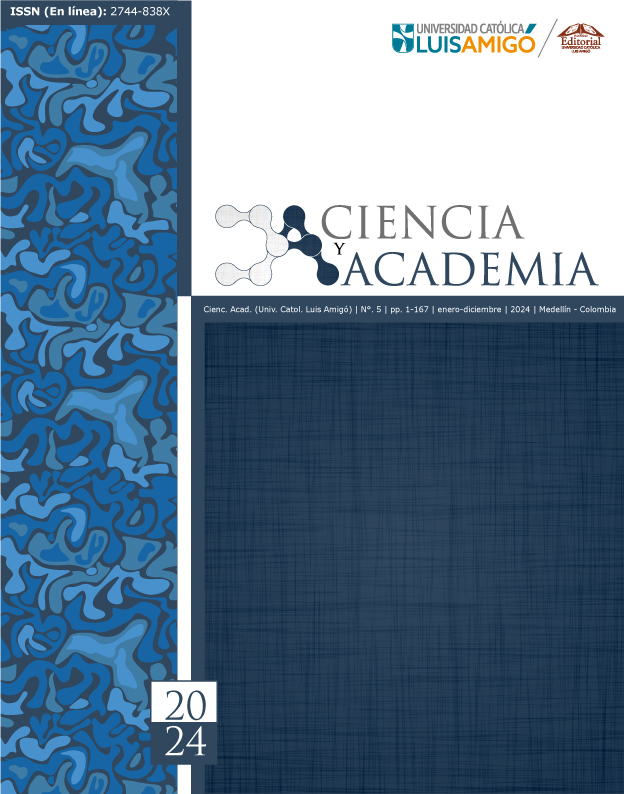Organizational changes implemented from Covid-19 in a chemical laboratory in the city of Medellín
DOI:
https://doi.org/10.21501/2744838X.4936Keywords:
Organizational changes, Competitiveness, Employment conditions, Covid 19, Productivity, Job satisfactionAbstract
The objective of the study was to determine the influence of the organizational changes implemented in a laboratory in the city of Medellin, generated by the Covid 19 pandemic, on organizational aspects of the administrative order and business structure. The methodological approach used was qualitative, which was developed from the case study method, which allowed systematizing the experiences of eight collaborators and two managers of a laboratory in the city of Medellin regarding the organizational changes perceived as a result of the Covid 19 pandemic, perceptions
collected through a focus group and two semi-structured interviews. The results show that organizational impacts have a direct influence on productivity since each
decision taken can increase or decrease the efficiency of the company, likewise, these changes influence job satisfaction, especially when there are staff cuts, since this situation can alter the work environment and fragment the sense of belonging. If productivity and job satisfaction are affected, competitiveness is compromised, a situation that forces organizations to review their management of change. One
of the central conclusions of the study indicates that organizational changes have an integral effect on organizations, which, depending on the type of management applied by the company, can generate positive or negative effects, since the course of the business, the stability of the collaborators, the efficiency of the processes and, in general, the competitive qualities of the organization depend on the management of change.
Downloads
References
Bnamericas. (21 de octubre de 2020). Reducción de personal por COVID-19 incide en producción de mineras. Bnamericas. https://www.bnamericas.com/es/noticias/reduccion-de-personal-por-covid-19-incide-en-produccion-de-mineras
Blofield, M., Hoffmann, B., & Llanos, M. (2020). Assessing the political and social impact of the COVID-19 crisis in Latin America. GIGA-Focus, 3(12), 1-13. https://nbn-resolving.org/urn:nbn:de:0168-ssoar-67260-7
Comisión Económica para América Latina y el Caribe. (2020). Sectores y empresas frente al COVID-19: emergencia y reactivación. Repositorio Cepal. https://repositorio.cepal.org/bitstream/handle/11362/45734/4/S2000438_es.pdf
Creasey, T. (19 de enero de 2022). The Costs and Risks of Poorly Managed Change. https://www.prosci.com/blog/the-costs-risks-of-poorly-managed-change
Flick, U. (2007). Introducción a la investigación cualitativa. Morata. ESPAÑA. https://investigacionsocial.sociales.uba.ar/wp-content/uploads/sites/103/2013/03/INVESTIGACIONCUALITATIVAFLICK.pdf
Gontkovicova, B., & Spišák, E. (2021). Assessment of Research and Development Financing Based on the Strategies in EU: Case of Sweden, Slovakia and Romania. Sustainability, 13(15), 8628. https://doi.org/10.3390/su13158628.
Gobernación de Antioquia. (19 de marzo de 2020). Cuarentena por la vida, Decreto Departamental 20200700001025. https://caucasiaantioquia.micolombiadigital.gov.co/sites/caucasiaantioquia/content/files/000423/21136_decreto-cuarentena-por-la-vida.pdf
González Morales, A. (2003). Los paradigmas de investigación en las ciencias sociales. Islas, 45(138), 125-135. https://islas.uclv.edu.cu/index.php/islas/article/view/572/532
Gragnano A., Simbula S., & Miglioretti M. (2020). Work–Life Balance: Weighing the Importance of Work–Family and Work–Health Balance. Int J Environ Res Public Health, 17(3). https://doi.org/10.3390%2Fijerph17030907
Hamui-Sutton, A., & Varela-Ruiz, M. (2013). La técnica de grupos focales. Investigación en Educación Médica, 2(5),55-60. https://www.elsevier.es/es-revista-investigacion-educacion-medica-343-articulo-la-tecnica-grupos-focales-S2007505713726838
Hernández Sampieri, R., Fernández Collado, C., & Baptista Lucio, P. (2014). Metodología de la investigación. McGraw-Hill.
Huerta-Dueñas, M., & Sandoval-Godoy, S. A. (2018). Sistemas de calidad como estrategia de ventaja competitiva en la agroindustria alimentaria. Agricultura, sociedad y desarrollo, 15(1), 19-28. http://dx.doi.org/10.22231/asyd.v15i1.746
Lárez, A. (27 de septiembre de 2016). La Gestión del Cambio (MOC) dentro de los procesos de la Gestión de Activos ISO 55001:2014. Linkedin. https://es.linkedin.com/pulse/la-gesti%C3%B3n-del-cambio-moc-dentro-de-los-procesos-iso-l%-C3%A1rez-cmrp#:~:text=%E2%80%9CAntes%20de%20implementar%20cualquier%20cambio,apartados%206.1%20y%206.2.2.
Nasir, S. (2017). Customer Retention Strategies and Customer Loyalty. Publicidad y Branding. http://dx.doi.org/10.4018/978-1-5225-1793-1.ch054
Otzen, T. & Manterola, M. (2017). Técnicas de Muestreo sobre una Población a Estudio. International Journal of Morphology, 35(1), 227-232. http://dx.doi.org/10.4067/S0717-95022017000100037
Pardo Enciso, C., & Díaz Villamizar, O. (2014). Desarrollo del talento humano como factor clave para el desarrollo organizacional, una visión desde los lideres de gestión humana en empresas de Bogotá D.C. Suma de Negocios, 5(11), 39-48. https://doi.org/10.1016/S2215-910X(14)70018-7
Quintero Arango, L. F., & Betancur Arias, J. D. (2022). Factores para el diseño de políticas de salario emocional. Fondo Editorial Universidad Católica Luis Amigó. https://doi.org/10.21501/9789588943640
Scarborough, M. (6 de marzo de 2013). Engaging suppliers in change management. Skillsoft global knowledge. https://www.globalknowledge.com/ca-en/resources/resource-library/articles/engaging-suppliers-in-change-management/
Scherling, D., & Camarero, I. (2021). Digital Transformation and Virtual Team Transition due to the COVID-19 Pandemic. [Tesis de maestría, Jönköping University]. http://hj.diva-portal.org/smash/get/diva2:1560965/FULLTEXT01.pdf
Sorensen, A. (2019). Organizational Change: The Opportunity for Talent Management. https://deepblue.lib.umich.edu/bitstream/handle/2027.42/151941/Linda?sequence=1
Ulrich, D., & Yeung, A. (2020). Reinventando la organización: cómo crear mayor valor en mercados en constante evolución. LID Editorial.
Tunk, N., & Kumar, A. (enero de 2022). Work from home–A new virtual reality. National Library of Medicine. doi: 10.1007/s12144-021-02660-0
Troncoso-Pantoja, C., & Amaya-Placencia, A. (2017). Entrevista: guía práctica para la recolección de datos cualitativos en investigación de salud. Revista de la Facultad de Medicina, 65(2), 329-332. https://doi.org/10.15446/revfacmed.v65n2.60235
Wahyuni, N., & Triatmanto, B. (2020). The effect of the organizational change on company performance mediated by changes in management accounting practices. Accounting, 6(12). 581-588. https://doi.org/10.5267/j.ac.2020.4.002
Wallin, J., Chirumalla, K., & Isaksson, O. (2013). Enabling organizational changes for development of product-service system offers. International Conference on Engineering Design. https://core.ac.uk/outputs/70603410
Wickford, H. (2019). Negative Impact of Organizational Change on Employees. CHRON. https://smallbusiness.chron.com/negative-impact-organizational-change-employees-25171.html
Published
How to Cite
Issue
Section
License
Copyright (c) 2024 Ciencia y Academia

This work is licensed under a Creative Commons Attribution-NoDerivatives 4.0 International License.
La revista y los textos individuales que en esta se divulgan están protegidos por las leyes de copyright y por los términos y condiciones de la Licencia Creative Commons Atribución-No Comercial- 4.0 Internacional. Permisos que vayan más allá de lo cubierto por esta licencia pueden encontrarse en http://www.funlam.edu.co/modules/fondoeditorial/






